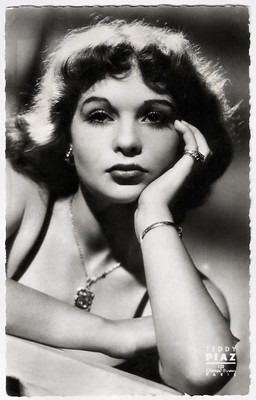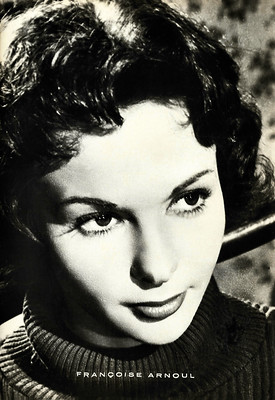French postcard by Editions P.I., Paris, no. 366. Photo: Lucienne Chevert.
French postcard by Edition du Globe, Paris, no. 429. Photo: Sam Lévin.
French postcard by Editions du Globe, no. 617. Photo: Sam Lévin, Paris.
French postcard by Editions du Globe, Paris, no. 113. Photo: Teddy Piaz, Paris.
French postcard by Edition du Globe, Paris, no. 355.
Dutch postcard by Gebr. Spanjersberg N.V., Rotterdam (Dutch licency holder of Ufa (Universum-Film Aktiengesellschaft, Berlin-Tempelhof), no. 1110. Photo: Sam Lévin, Paris.
Undressed scenes
Françoise Arnoul was born as Françoise Annette Marie Mathilde Gautsch in Constantine, France (now Algeria), in 1931. Her father was a general in the army, Charles Gautsch; her mother was a former stage actress, Jeanne Gradwohl, who worked before her marriage under the name of Jeanne Henry.
Françoise grew up in Rabat and Casablanca, and after WWII she returned to Paris. Her mother proved to be valuable support when her daughter expressed a desire to take courses in drama. She attended the drama classes of Andree Bauer-Thérond, and made her film debut as an extra in Rendez-vous de juillet/Rendezvous in July (Jacques Becker, 1949).
Her first bigger role was in L'Épave/Sin and Desire (Willy Rozier, 1949) in which she had some undressed scenes. It made her a star overnight. She was touted as the newest French sex symbol in films like Nous irons à Paris/We Will All Go to Paris (Jean Boyer, 1950) opposite nice and attractive Philippe Lemaire.
In the morally rigid 1950s, she played sexy and sensuous characters, that were also often troubled and destructive. She was the perverse femme fatale in films like the Georges Siménon adaptation Le Fruit défendu/Forbidden Fruit (Henri Verneuil, 1952) in which she seduces a country doctor played by Fernandel and La Rage au corps/Tempest in the Flesh (Ralph Habib, 1953) in which she is the unfaithful wife of Raymond Pellegrin.
Wildly successful was the Film Noir La Chatte/The Cat (Henri Decoin, 1958) in which she played a black leather-clad resistance fighter during World War II. Arnoul made of her questioning scene by the Nazis an erotic extravaganza as she slowly removes her stockings under the officer's lecherous eyes.
German postcard by Ufa, Berlin-Tempelhof, no. CK-1. Photo: Unifrance Film.
French postcard by Editions P.I.. Paris, no. 1055. Photo: Sam Lévin.
French postcard by Imp. De Marchi Frères, Marseille.
German postcard by Ufa, Berlin-Tempelhof, no. CK-288. Photo: Klaus Collignon / Ufa.
German postcard by Universum-Film Aktiengesellschaft (Ufa), Berlin-Tempelhof, no. CK 141. Photo: Klaus Collignon / Ufa.
German postcard by WS-Druck, Wanne-Eickel, no. F 105. Photo: Ringpress / Union / Vogelmann.
Belgian collector's card, no. 9; Collector's card, no. 98.
An animal endowed with happiness
The unusually pretty and petite Françoise Arnoul proved her talent and range in such highly regarded films as Michelangelo Antonioni’s episode film I Vinti/The Vanquished (1953), the wonderful Fernandel comedy Le Mouton à cinq pattes/The Sheep Has Five Legs (Henri Verneuil, 1954), and Jean Cocteau's Le Testament d'Orphee/The Testament of Orpheus (1960).
In Jean Renoir's classic French Cancan/French Can-Can (1955), she played Nini, a young laundress from Montmartre, who conquers the Moulin Rouge with her sexy dance.
In 1964, during the shooting of Compartiment tueurs/The Sleeping Car Murder (Costa-Gavras, 1965), she met director Bernard Paul who would become her life partner. From 1956 till 1960, she had been married to publicity agent Georges Cravenne, the future father of the César and Mollière awards.
In the following years, she focussed on assisting Paul with his first films. Together with Marina Vlady, they founded in 1968 the production company Francina, which would produce films like Dernière sortie avant Roissy/Last Exit Before Roissy (Bernard Paul, 1977). Paul died in 1980. His loss affected Francoise dearly and she had difficulty regaining a foothold in the cinema.
During the 1970s her film career had tapered off, but she appeared in Raul Ruiz’ Diálogos de exiliados/Dialogues of the Exiled (1975) and Violette & François (Jacques Rouffio, 1977) as the mother of Violette (Isabelle Adjani). She also had some success as a television actress.
In the late 1990s, Françoise Arnoul returned on the screen in character roles in such films as Temps de Chien/Dog Days (Jean Marboeuf, 1996), Post coitum animal triste/Smell of Geraniums (Brigitte Roüan, 1997) and Merci pour le geste/Thanks for the Gesture (Claude Faraldo, 2000). She published her autobiography entitled 'Animal doué de Bonheur' (Animal endowed with happiness) in 1995. In 1997, she was the president of the jury of the Caméra d'Or at the Cannes Film festival.
Françoise Arnoul lived in Paris and remained active as a TV actress. In his bio at Les Gens de Cinéma, Yvan Foucart wrote: "The young vamp has given way to a blooming woman whose wonderful face radiates serenity. She kept her beautiful smile, her eyes still have the same sparkle and she kept an admirably slim silhouette. (...) So, dear Francoise, you understand why we can not forget you. And why we are still in love with you."
Her final film was Le Cancre (2016), directed and written by Paul Vecchiali. At the age of 90, Françoise Arnoul passed away after a long illness in Paris on 20 July 2021.

Vintage card.

Vintage postcard. Photo: Sam Lévin.

French postcard by Editions du Globe, Paris, no. 122. Photo: Teddy Piaz, Paris.

Vintage postcard. Photo: Sam Lévin / Unifrance.

Italian postcard by Bromofoto, Milano, no. 422. Photo: Lux Film. This is NOT Françoise Arnoul, but Spanish actress Marisa De Leza, who played the role of Isabella, Arnoul’s sister, in Les amants de Tolède/The Lovers of Toledo (Henri Decoin, Fernando Palacios, 1953). Thanks to Marlene Pilaete who discovered the MISTAKE and identified the portrayed actress.

French postcard by Editions P.I., Paris, no. FK 1213. (P.I. was French licence holder for Ufa, Berlin-Tempelhof.) Photo: Angelo Pennoni, Rome / Pallas Filmverleih. Françoise Arnoul in Delirio/Storm (Pierre Billon, Giorgio Capitani, 1954).

French postcard by Editions du Globe, Paris, no. 236. Photo: Studio Harcourt.

Bulgarian postcard by Bulgarska Fotografia, Sofia.

French postcard by Editions P.I., Paris, offered by Les Carbones Korès "Carboplane", no. 796.
German postcard by Ufa, Berlin. Retail price: 25 Pfg. Photo: Cinepress / Pallas Film.
German postcard. Photo: Unifrance film.
French postcard by Editions P.I., Paris, no. 366. Photo: Lucienne Chevert.
Sources: Yvan Foucart (Les Gens de Cinéma - French), Sandra Brennan (AllMovie), AlloCiné (French), Wikipedia, and IMDb.
10 comments:
Great blog you have there. I love those shots of old film stars.
Beautiful woman and quite a study in changing hairstyles, too! :D :D :D Happy PFF!
I was interested in the hairstyles too. The face is the same, but she looks totally different with different hairstyles.
She matured very beautifully, in looks and talent.
I was thinking the same thing about the hairstyles...doesn't even look like the same woman!
I was thinking she looked better young, and didn't age that well. I suppose it could be the hairstyles, but that Dutch photo is NOT flattering.
Wonderful cards.
Do you have any film star postcard available for swap?
Or, if you find a postcard with wild mammal(s), and it might be available for swap with me, please let me know.
:)
I so enjoy reading your excellent summaries of these stars. And the photos are fun, to see changing styles and the kinds of poses that are adapted from one era to the next.
She looks so familiar! I didn't recognize any of the film titles you listed, but I know I must have seen at least one!
Happy PFF - a little late.
Post a Comment